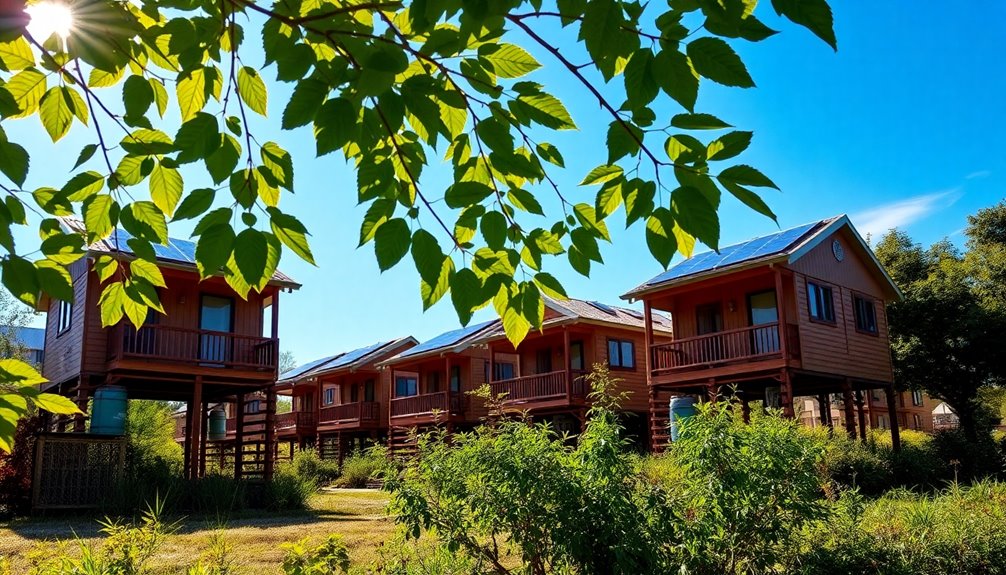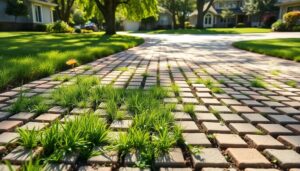Modular homes on sticks are eco-friendly because they use efficient construction processes that minimize waste and energy consumption. Built in factories, they generate up to 70% less waste than traditional homes. You'll also enjoy energy savings of up to 20% due to superior insulation and air filtration. Plus, many of these homes incorporate sustainable materials, leading to healthier living spaces. Explore how these benefits set modular homes apart from conventional building methods.
Understanding Modular Homes and Their Construction Process
When you explore modular homes, you'll find they offer a unique construction process that sets them apart from traditional homes.
These prefabricated structures are built in a factory, which allows for precise construction and significant waste reduction—up to 70% less waste compared to stick-built homes. Additionally, many expense tracking tools designed for entrepreneurs can help manage and monitor the costs associated with building these homes. Furthermore, the use of sustainable materials during construction aligns with the growing trend towards eco-friendly practices.
The construction process involves creating modules that are then transported and assembled on-site, dramatically cutting down construction time to just a few weeks.
Modular homes are built to meet or exceed local building codes, ensuring high-quality standards. Additionally, the use of eco-friendly building materials during this factory-controlled process minimizes environmental disruption, leading to less dust and soil erosion. This combination of efficiency and sustainability makes modular homes an increasingly popular choice. Moreover, the advanced receipt scanning technology used in expense management apps can help homeowners track construction costs effectively.
The Environmental Benefits of Modular Home Building
While traditional construction methods contribute considerably to environmental degradation, modular home building offers a more sustainable alternative.
By opting for modular homes, you benefit from a construction process that produces up to 70% less waste, greatly lowering the environmental impact. The factory-controlled setting allows for efficient use of sustainable materials, leading to about 45% fewer carbon emissions compared to conventional methods. This approach not only promotes sustainable consumption patterns but also encourages consumers to make environmentally conscious choices. Monitoring savings and investments is crucial for understanding the financial benefits of this eco-friendly decision.
Additionally, these homes often exceed Energy Star standards, maximizing energy efficiency and reducing your overall energy consumption. With high-quality insulation and eco-friendly options like low-VOC materials and sustainable wood, modular homes not only create a healthier living space but also promote a lifestyle that prioritizes sustainability.
Furthermore, choosing modular homes supports sustainable packaging solutions, as many manufacturers focus on eco-friendly practices throughout their supply chain.
Embracing modular living is a step toward a greener future.
Waste Reduction in Modular Construction
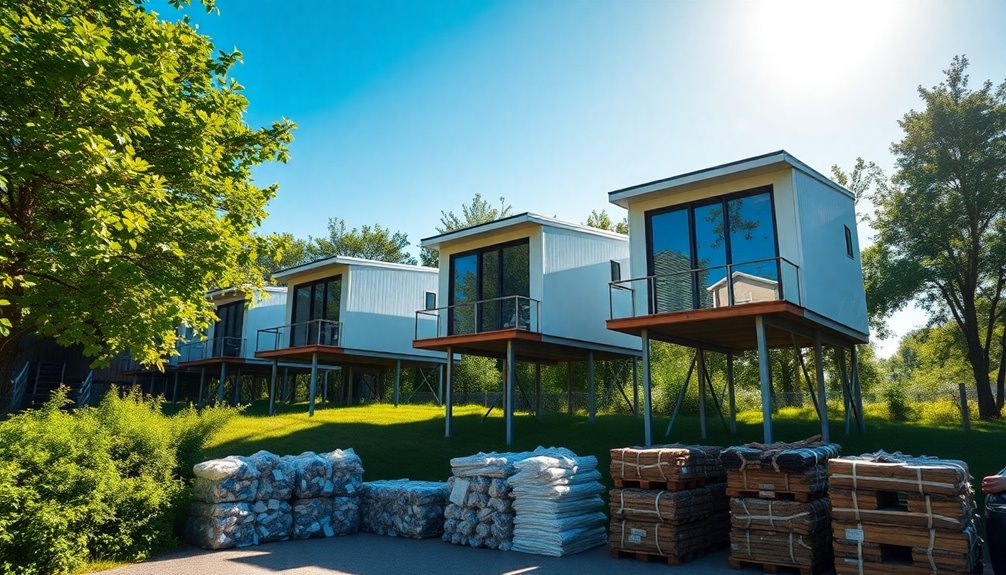
By choosing modular construction, you greatly reduce waste generated during the building process. In fact, modular homes produce up to 70% less waste compared to traditional stick-built homes. The factory-controlled environment optimizes material usage and inventory management, minimizing excess production. Plus, leftover materials can often be recycled or reused, further enhancing waste reduction. This approach aligns with sustainable and ethical shopping practices that emphasize conscious consumerism and resource conservation. Additionally, adopting ethical manufacturing practices ensures that the materials used in modular construction are sourced responsibly and sustainably. Furthermore, the emphasis on financial discipline in managing budgets can also be applied to the construction process, ensuring that resources are allocated efficiently.
Here's a quick comparison:
| Aspect | Modular Construction |
|---|---|
| Waste Produced | Up to 70% less than traditional |
| Recyclable Materials | Often reused for future projects |
| Carbon Emissions | 45% less during construction |
| Environmental Footprint | Smaller due to fewer disruptions |
| Soil Erosion | Reduced due to streamlined processes |
This approach not only conserves resources but also greatly lowers your environmental footprint.
Energy Efficiency and Cost Savings
As you explore the benefits of modular homes, you'll find that their energy efficiency and cost savings stand out prominently.
These homes are built to high energy efficiency standards, often exceeding Energy Star requirements, which means lower utility bills for you. With high-quality insulation and air filtration systems, modular homes eliminate drafts, cutting heating and cooling costs considerably. You can save up to 20% on energy expenses compared to traditional stick-built homes. Additionally, many homeowners can benefit from automated savings by utilizing financial tools that help track expenses and optimize budgeting for ongoing costs. By employing budgeting tools, you can ensure that your savings align with your financial goals, further enhancing your ability to manage ongoing expenses effectively.
Furthermore, the factory-controlled environment reduces waste and allows for the reuse of materials, contributing to lower construction costs. The predictable pricing structure of modular homes helps you avoid unexpected expenses, making them a smart, financially sound choice for energy-conscious buyers like you. Furthermore, the reduced waste in modular home construction leads to a more sustainable building process, benefiting both the environment and your wallet.
Sustainable Materials Used in Modular Homes
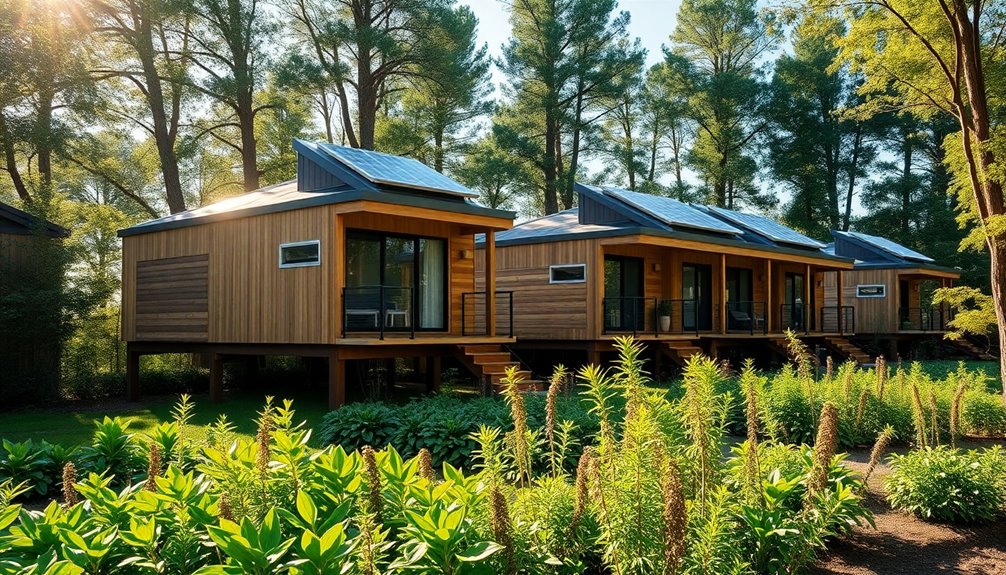
When you choose a modular home, you're not just investing in a structure; you're also opting for sustainable materials that enhance both your living space and the environment.
These eco-friendly choices, like low-VOC paints, bamboo plywood, and FSC-certified wood, help improve indoor air quality and support sustainable forestry. Furthermore, utilizing sustainable materials not only benefits the environment but also aligns with modern consumer preferences for eco-conscious living. Additionally, the use of eco-friendly options can lead to significant savings on energy costs over time.
Plus, modular homes are built in a factory-controlled setting, producing about 70% less waste than traditional methods.
This efficiency also extends to energy-efficient features that often exceed Energy Star standards, lowering energy consumption.
High-quality insulation further guarantees better temperature regulation, which translates to reduced energy bills and lower carbon emissions.
Furthermore, many modular homes utilize high-quality insulation that contributes to their overall energy efficiency and sustainability.
How Modular Homes Minimize Site Disruption
Modular homes cut down construction time to just days, which means you'll experience far less disruption to the environment around your new home.
By using precise planning and eco-friendly materials, these homes generate less waste and have a smaller on-site footprint.
This approach not only preserves local ecosystems but also minimizes your carbon footprint during the building process.
Reduced Construction Duration
While traditional home construction can drag on for nine months to a year, the timeline for modular homes shrinks dramatically to just three to four months. This reduced construction duration minimizes site disruption and lessens the environmental impact.
Since modular homes are constructed in a factory, they avoid weather-related delays, ensuring a smoother process. With only a few days needed for on-site assembly, you'll experience less dust, soil erosion, and chemical exposure, leading to a healthier building environment.
Additionally, this method generates up to 70% less construction waste compared to traditional homes, which means a more efficient use of resources. All these factors contribute to a quicker, cleaner, and more eco-friendly building experience.
Less Environmental Impact
By constructing homes in a factory setting, builders greatly reduce site disruption and its associated environmental impacts.
Modular homes are assembled on-site in just a few days, while traditional construction methods can cause environmental disturbances for months or even over a year. This quick assembly minimizes soil erosion and dust production, promoting a healthier ecosystem.
Additionally, factory production of modular homes generates up to 70% less waste, thanks to efficient material usage and recycling of leftovers. The controlled environment guarantees precise construction, reducing errors and the need for corrections on-site.
All these factors make modular homes an eco-friendly choice, allowing you to enjoy your new space while minimizing your impact on the environment.
The Role of LEED Certification in Modular Home Construction
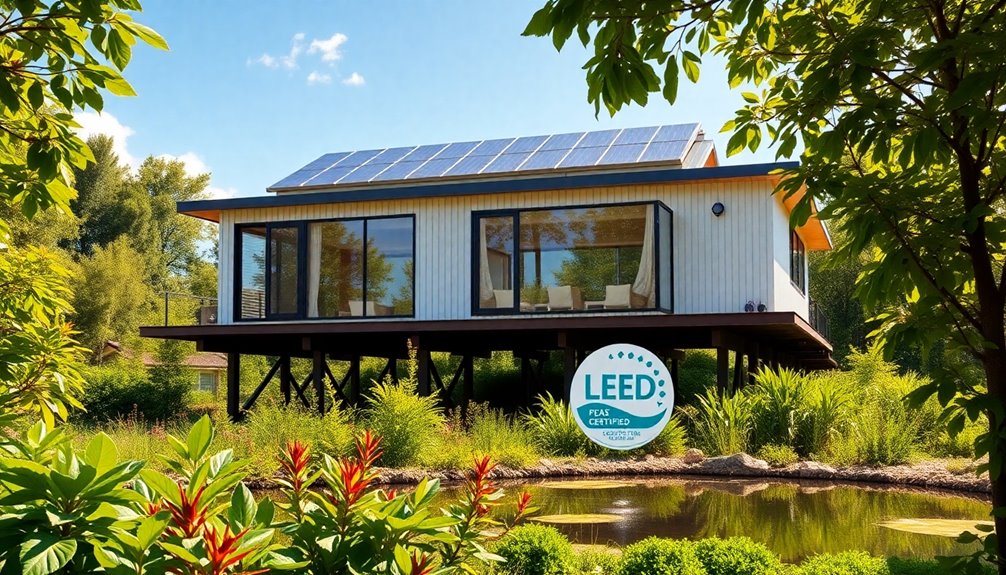
When it comes to sustainable construction, LEED Certification plays an essential role in enhancing the appeal of modular homes. This globally recognized standard showcases a building's commitment to sustainable practices, making it easier for you to choose eco-friendly options.
Modular homes can achieve LEED Certification by incorporating eco-friendly materials, energy-efficient designs, and sustainable construction techniques, greatly boosting their marketability. The strict criteria for LEED Certification guarantee that these homes excel in energy performance, water efficiency, and indoor environmental quality.
Comparing Modular Homes to Traditional Building Methods
Modular homes offer a compelling alternative to traditional building methods, particularly when it comes to efficiency and sustainability.
These homes produce up to 70% less waste during construction, thanks to precise factory production methods. In fact, they can be built in just three to four months, markedly cutting down construction time compared to the nine months or more required for traditional homes.
Additionally, modular homes generate around 45% less carbon emissions during production, contributing to a smaller carbon footprint.
Many of these homes also feature energy-efficient options that meet or exceed Energy Star standards, leading to lower utility costs and a reduced environmental impact over time.
The Future of Eco-Friendly Housing Solutions
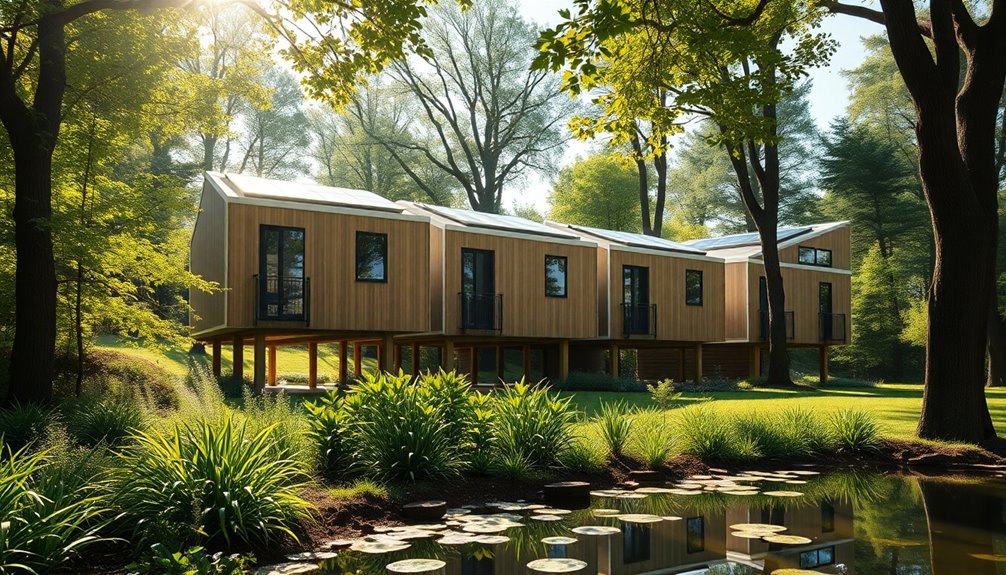
As the demand for sustainable living solutions grows, innovative housing options are emerging to meet eco-conscious needs. Modular homes stand at the forefront, utilizing eco-friendly materials and efficient construction methods. They reduce carbon emissions by about 45% compared to traditional homes, while also minimizing site disruption.
| Feature | Modular Homes | Traditional Homes |
|---|---|---|
| Waste Production | 70% less waste | High waste |
| Carbon Emissions | 45% lower emissions | Higher emissions |
| Energy Efficiency | Exceeds Energy Star | Varies widely |
With superior insulation and air filtration, modular homes enhance energy efficiency, leading to lower utility bills. The future of housing lies in these sustainable solutions, promoting healthier living environments for you and your family.
Conclusion
In a world where every choice counts, opting for a modular home is like planting a tree in your backyard—it nurtures the planet while providing shelter. Just as a tree grows quickly with the right care, modular homes pop up efficiently, using fewer resources and reducing waste. By choosing this eco-friendly option, you're not just building a house; you're investing in a healthier future for yourself and the environment. So, why not make that choice today?

